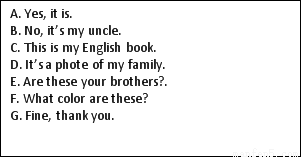网址:http://m.1010jiajiao.com/timu3_id_2643375[举报]
阅读下面对话,从方框内7个选项中选择5个恰当的句子完成此对话。

A: Hello, Alice! How are you?
B: ___1.___. How are you, Bob?
A: I’m OK, thanks. What’s this, Alice?
B: ___2.___
A; Is this your father?
B: ___3.___
A: Oh, your uncle. Is this your sister?
B: Yes, she is my sister.
A: What’s her name?
B: Linda.
A: ___4.___
B: No. They’re my cousins.
A: Excuse me, Is this your notebook? I found it in the library.
B: Oh, ___5.___. Thank you very much.
A: You’re welcome.
查看习题详情和答案>>
|
Ⅰ |
Ⅱ |
||||
|
1.How are you? 2.What’s your phone number? 3.I’m Lucy, What’s your last name? 4.What’s this in English? 5.What color is the dictionary? 6.Good morning, Linda! 7.What’s your first name? 8.How do you spell your name? 9.Is this a gold ring? 10.Your English is good. |
E. Yes, it is. F. It’s green. G. Thanks. H. Good morning, Miss Green. I.E-M-M-A, Emma. J. It’s Tim. |
查看习题详情和答案>>
根据句意和汉语提示以及首字母,拼写单词。(10分)
1. How are you________(今天)?
2. I want to buy a house with a __________ (花园).
3.There are (13)bags behind the chairs.
4. —How many _ (办公室) are there in the building?
—Forty.
5. This is Carl. He is very ________ (乐于助人的).
6. Sally is a ________ (漂亮) girl. She likes nice clothes.
7. Look! It’s a (照片) of Simon’s family.
8. My (祖父) is an old teacher. He is 60 years old now.
9. My uncle is a d in that hospital.
10. There are three people in my f________.
阅读短文,根据意思,判断所给句子的正误。正确的写T,错误的写F。
“How are you?” is a nice question. It’s a friendly way that people in the U.S.A greet(问候) each other. But “How are you?” is also a very unusual(不寻常的) question. It’s a question that often doesn’t need an answer. The person who asks“ How are you?” hopes to hear the answer “Fine”, even if the person’s friend isn’t fine. The reason is that “How are you?” isn’t really a question and “Fine” isn’t really an answer. They are simply (只)other ways of saying “Hello” or “Hi”.
Sometimes, people also don’t say exactly(确切) what they mean. For example, when someone asks “Do you agree?”, the other person might think, “No, I disagree. I think you’re wrong...”But it isn’t very polite to disagree so strongly(强烈地), so the other person might say “I’m not sure.” It’s a nicer way to say that you don’t agree with someone.
People also don’t say exactly what they are thinking when they finish talking with other people.For example, many talks on the phone finish when one person say “I’ve to go now.” Often, the person who wants to hang up(挂)says: “Someone’s at the door.” “Something is burning (烧)on the stove(炉).” The excuses(借口) might be real(真的), or not. Perhaps the person who wants to hang up simply doesn’t want to talk any more, but it isn’t polite to say that. The excuse is more polite, and it doesn’t hurt (伤)the other person.
Whether they are greeting each other, talking about an idea, of finishing a talk, people don’t say exactly that they are thinking. It’s an important way that people try to be nice to each other, and it’s part of the game of language.
1.“How are you?” is another way of saying "Hello." or" Hi."
2.It is polite to say" No. I disagree. I think you are wrong, "if you don’t agree with others.
3.When someone says "I have to go now "On the phone,it means he wants to go on talking.
4."Someone is at the door." may be an excuse for finishing a talk.
5.Sometimes people don't say exactly what they are thinking about just because they try to be nice to each other.
查看习题详情和答案>>
